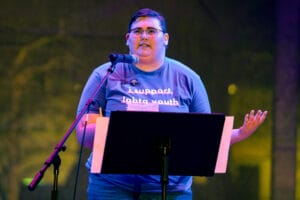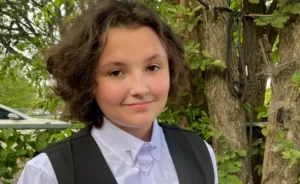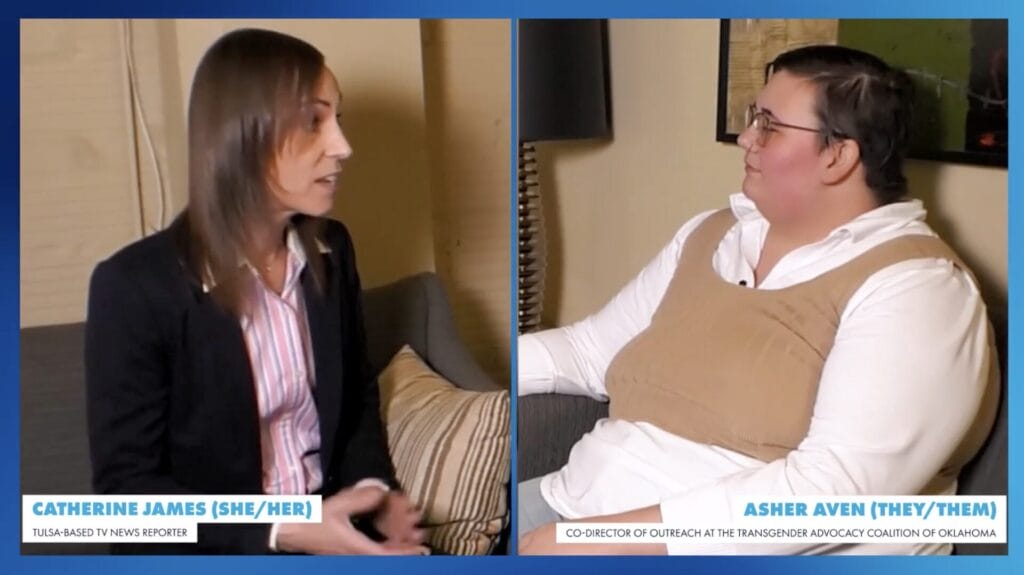Today GLAAD published a new video showcasing an interview between Asher Aven, the co-director of outreach at the Trans Advocacy Coalition of Oklahoma (TACO); and Catherine James, a Tulsa-based transgender TV news reporter, discussing the landscape for transgender rights in Oklahoma and in America. The interview covers the need for TACO and other social justice work, Asher and Catherine’s personal experiences navigating life in Oklahoma as transgender residents, Asher’s intersecting identities as nonbinary and Indigenous, and the scope of work that remains to ensure equal rights for LGBTQ and especially transgender Oklahomans.
Asher was born in Pryor, Oklahoma, and raised in Inola, just east of Tulsa. In realizing they are nonbinary and their coming out experience, Asher explains that their understanding around their identity happened gradually over time. “For a long time I’ve just never really felt like I was a woman or a man; I was just kind of something else — I was just me. … I never strongly fit into the woman perspective growing up. I was always pushed into keeping up my appearance in ways that I thought were constricting to me when especially the boys in my life didn’t have to do that. I think that’s probably where it started. I was pushing back against that because I didn’t want to do it; it didn’t feel right for me. .. That push and pull of my gender kind of built over time and now I have more clear ideas of what I feel like I am and what my body should look like, and what I should be wearing just because of how I feel.”
Asher and Catherine tackle issues currently affecting their community such as safety and the struggle to live authentically as trans people in a conservative state. On the intersections of being transgender, nonbinary, and Indigenous, Asher explains, “It’s difficult. It’s like walking on eggshells every time I go outside. I often don’t feel safe to walk or go places alone by myself. It’s hard to live feeling so restricted that anything could happen at any time.” Asher is invested in learning as much as they can about the history of what different Indigenous tribes went through in Oklahoma, stating “We’ve all faced similar oppression.”
“Nonbinary” is a term often used by people who experience their gender identity and/or gender expression as falling outside the binary gender categories of “man” and “woman.” Many nonbinary people also call themselves transgender and consider themselves part of the transgender community, while others do not. UCLA’s Williams Institute released a report in 2021 analyzing two different population surveys, and found that 1.2 million adult Americans (11% of all LGBTQ adults) describe themselves as nonbinary. A July 2021 Trevor Project study of 35,000 LGBTQ youth ages 13-24 found that 26% said they are nonbinary. For more about the specific issues nonbinary people face, visit https://glaad.org/reference/nonbinary/.

Research details the compounded oppression of LGBTQ people of color; and studies specifically point to the negative experiences of indigenous transgender and nonbinary people. For example, according to the 2015 US Transgender Survey, 41% of people who are transgender and indigenous reported living in poverty, 23% reported being unemployed, and 21% reported they had lost a job due to being transgender. In addition, 57% reported experiencing homelessness at some point in their lives. GLAAD’s Media Reference Guide section on communities of color provides additional information and context about discrimination faced by indigenous LGBTQ people.
Both Asher and Catherine are currently based in Tulsa, an area which earlier this year received national attention following the death of Nex Benedict, a 16-year-old transmasculine and nonbinary teenager of Choctaw ancestry who used he/him and they/them pronouns according to loved ones. Nex died the day after being attacked three-on-one in a restroom at Owasso High School in Owasso, Oklahoma, in early February. “I’ve been a part of the Cherokee Nation since I was born but I haven’t really gotten to know what that means for me yet, and that’s why it makes me so sad that Nex Benedict didn’t get the opportunity to really explore their identity,” says Asher in the video.

Nex’s death came shortly following Oklahoma’s enactment of some of the most extreme anti-LGBTQ and specifically anti-trransgender laws in the nation. In 2022, Oklahoma lawmakers passed a law requiring that students only be allowed to use the bathrooms that align with their sex assigned at birth; passed a law banning transgender students from school sports; and passed a law that banned birth certificate markers different from “female” or “male.” In August 2023, Gov. Kevin Stitt issued an executive order requiring state agencies to use limited definitions of female and male. And in November 2023, the state Department of Education passed a rule mandating that all school staff report any student they know or suspect to be queer or trans to that student’s parents and/or guardians, further limiting access to having safe conversations about being LGBTQ or 2STGNC+ (Two Spirit, Transgender, Gender Nonconforming+), even among friends, in a school environment.
Following Nex’s death, GLAAD, the Human Rights Campaign, and hundreds of other LGBTQ and civil rights organizations publicly called for the removal of Ryan Walters as the Oklahoma public schools superintendent. The letter can be found here. GLAAD also ran an Oklahoma-based ad campaign highlighting Ryan’s self-serving ambitions and failures to prioritize Oklahoma students. Walters’ full record of anti-LGBTQ attacks and rhetoric can be found here.
Asher and Catherine describe the difficulty of finding a job in Tulsa and feeling confident that an employer will be LGBTQ-friendly and support them. “It’s hard to work for a local company here and think, ‘I’m going to be protected,’” says Asher, noting that it’s always possible a company may side with a hateful customer who harasses them or uses slurs. Catherine talks about her experience being fired in January as a news anchor in Tulsa despite the support she had among the local community. “I was even a local public figure of sorts … Even for a person with a following like that, it didn’t even matter in the face of everything. They wanted a reason, they found a reason and then I was gone.” Catherine was in everyone’s living room through her reporting, and received regular positive feedback about how much people loved it and watched the local Fox affiliate just to see her segments. She still gets recognized when going about her daily life and asked by local community members about her work.

Overall in 2024, over 500 anti-LGBTQ bills were introduced across the country, the majority of which target transgender Americans’ access to health care and LGBTQ youth’s freedom and equal opportunity at school. This means that a majority of anti-LGBTQ bills proposed in 2024 specifically sought to harm transgender youth by making it difficult or impossible to live safely and free as their authentic selves. So far, more than 200 of these bills have been defeated, while approximately two dozen have been signed into law. Federal courts in at least seven states had ruled against bans on health care for transgender people or blocked them from being enacted as of early 2024, including rulings by three Trump-nominated justices.
The attacks on LGBTQ and transgender lives disproportionately affect transgender, nonbinary, and gender nonconforming people who are also members of marginalized communities, such Black, Indigenous, and/or other LGBTQ people of color. Transgender and nonbinary people, including youth, face disproportionate violence, discrimination, harassment, and hate due to the stigma that they don’t or shouldn’t exist. Indigenous people are missing and murdered at exponentially higher rates than the rest of the population; and transgender people face a similar epidemic of violence, often continuing to face disrespect in death through media and police reports that erase their authentic gender.
The onslaught of attacks is also at odds with broad public opinion in support of LGBTQ and transgender Americans. Current Gallup polling indicates record-high support for the freedom to marry (71%), and nondiscrimination protections for LGBTQ people (84%). More than 7% of U.S. adults are out as LGBTQ, including 20% of Gen Z, the most out generation in history. A projected 14% of voters will be out as LGBTQ by 2030.
At the video’s conclusion, Asher looks back on the time before they became an activist. “Before 2023, I would stand on the sidelines. … But I can’t live my life without saying something anymore. We’re not giving up and I want [others] to know they can support us from outside the state; and keeping their states safe as well is very important.”
GLAAD is proud of an ongoing partnership with TACO and other local Oklahoma groups, and grateful for Asher and Catherine’s participation in this project. To learn more about the Trans Advocacy Coalition of Oklahoma (TACO) and get more involved, visit https://transadvocacyok.org/. To watch the full interview on YouTube, visit https://youtu.be/1qxQDPeWSH4.














